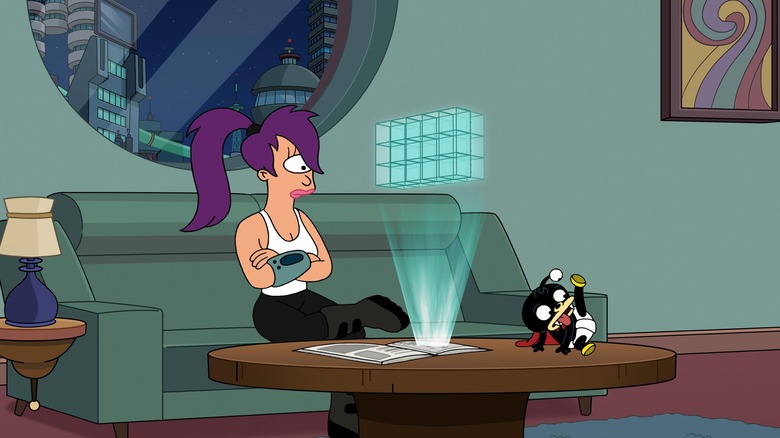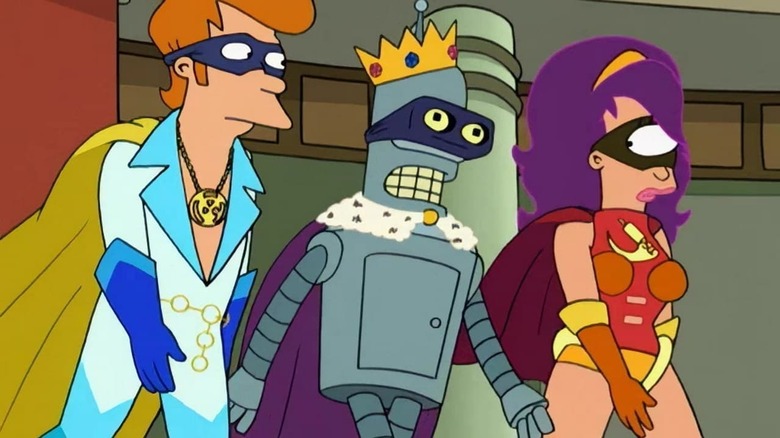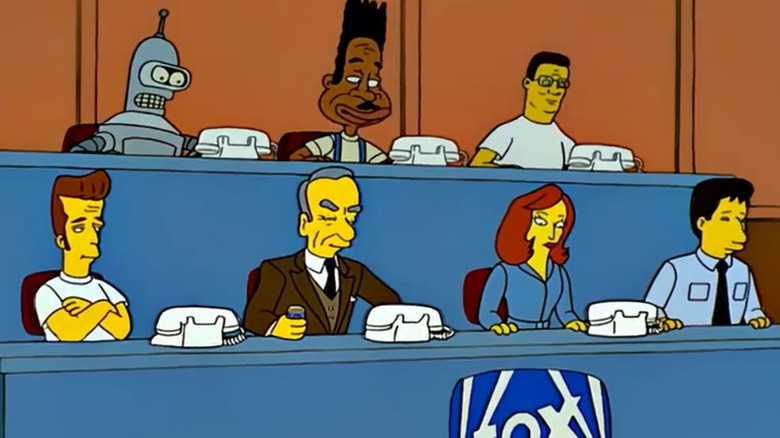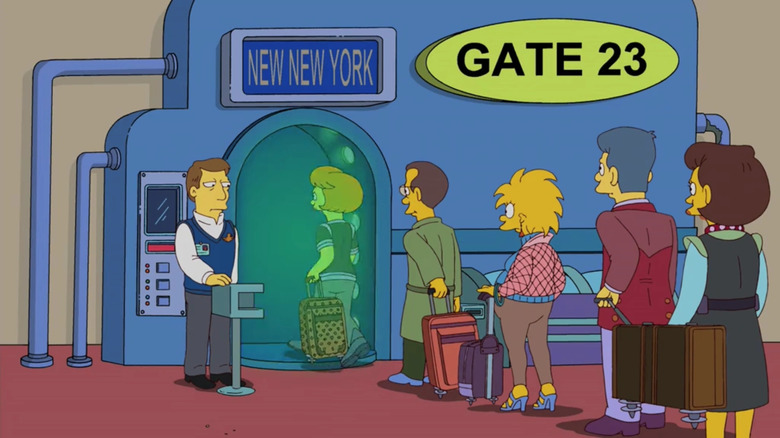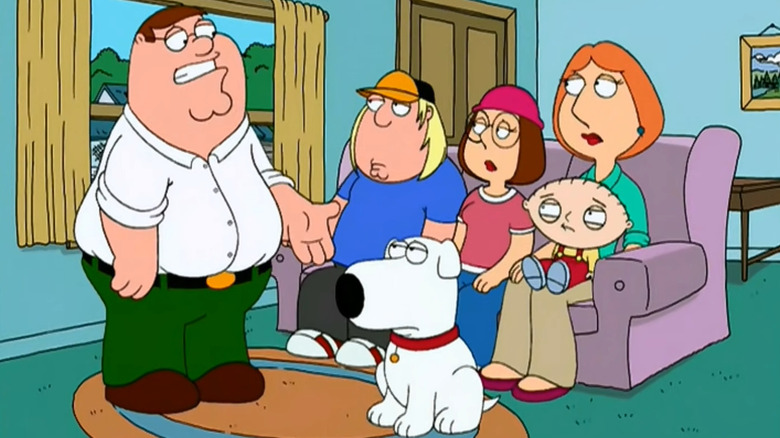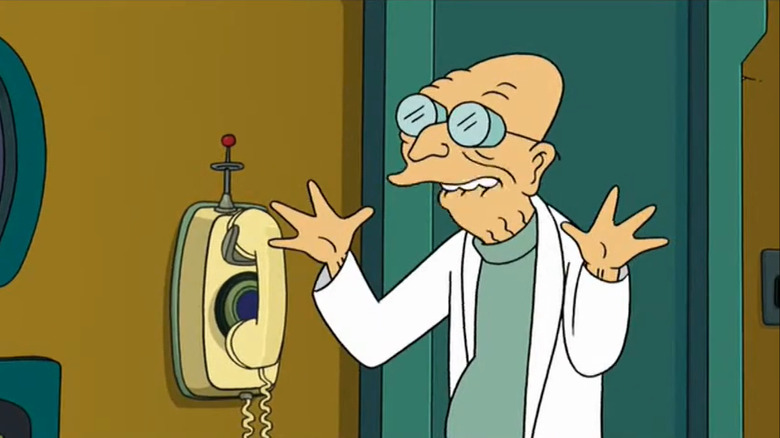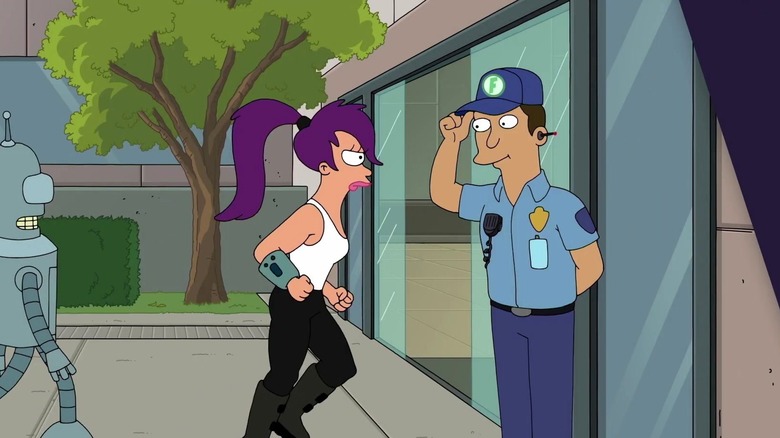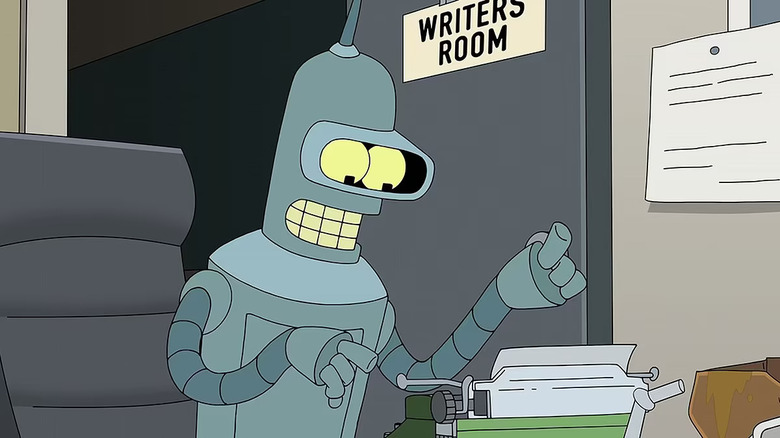Why Are Futurama's Episodes Out Of Order On Hulu?
If you're watching "Futurama" for the first time on Hulu, there will be a few moments that confuse you. For instance, the season 4 episode "Love and Rocket" ends with Fry successfully making a romantic gesture towards Leela. The episode concludes with the two of them (plus Zoidberg) sharing a tender moment together, with the implication that this is the start of a new, more openly-romantic time for them. It's not clear if they're going to be boyfriend and girlfriend yet, but it does promise that this is the end of either of them childishly pretending like they don't like each other.
Then the next episode starts, and Fry is making a dig at Leela for talking about her long-lost parents too much. It's a weirdly mean-spirited moment; it would make sense if it happened a few episodes earlier, but right after "Love and Rocket," it just feels jarring. Did something happen between episodes to kill the romantic buzz between these two characters? If you're binging on Hulu, this big shift backwards occurs within the span of about thirty seconds.
It all starts to make sense once you look at the episodes' production order. "Love and Rocket" was produced as the third episode of season 4, and the next episode ("Leela's Homeworld") was intended as the season's second episode. The Fox network chose to release them in the opposite order; it kind of makes sense when you consider they wanted to squeeze "Love and Rocket" in before Valentine's Day, but then you look at the month-long gap between it and the previous episode, and you start to wonder why Fox couldn't have handled its time better.
A bit of a mess
The episode produced after season 4's "Love and Rocket" was season 5's "Less than Hero," in which Fry and Leela develop superpowers and become vigilantes together. This one makes a lot more sense as a follow-up, as Fry and Leela are basically half-dating in this one anyway. Watching on Hulu, all of this isn't just confusing because these episodes are inexplicably one season apart, but because season 5 of "Futurama" technically doesn't really exist anyway. Before Fox canceled the show, the production of "Futurama" was done in four slates. It's just that Fox kept messing around and delaying the airing of the show's episodes, resulting in those four seasons being stretched into five.
This wasn't the first time a network has aired episodes out of order — "The Simpsons" had plenty of episodes produced in one season that aired during the next one, for instance — but "Futurama" was more serialized than the cartoons that came before. Not only was it constantly introducing new sci-fi elements and building on them, but Fry and Leela's relationship was far less stable than Homer and Marge's. Over the course of the show, they gradually go from antagonistic strangers to lovers; it's a slow-burn storyline that was repeatedly undermined by Fox's constant episode rearrangements.
But why?
Fox's interference with "Futurama" went beyond the delays and the episode order. They also messed around with the time slots in a way that seemed designed to hurt the show's ratings. They switched the time slot three times in season 2 alone, and when the show aired on Sunday nights, Fox often let NFL games going into overtime run into their scheduled slot. Instead of postponing the whole block of episodes, Fox would skip over "Futurama" while airing "The Simpsons" at its regularly-scheduled time.
It's all a little strange, because both "Futurama" and "The Simpsons" were created by Matt Groening. Why would Fox be so nice to one of his shows while constantly sabotaging his other one? As Matt Groening himself put it, it had to do with how Groening wouldn't let them interfere creatively with the series. "The people at Fox didn't ever support the show and it wasn't to their taste and, in my opinion, they're out of their minds," he said in a 2003 interview. "But they don't like 'The Simpsons' either. The idea of a TV show that they haven't gotten their greasy fingers all over creatively drives them nuts. That's why almost everything else is so lousy."
Both "The Simpsons" and "Futurama" got to be run without much studio interference, but for different reasons and with different results. As "Simpsons" writer Harry Shearer said in a 2004 interview, "The Simpsons exist totally through a series of flukes. Chief of which was that, because the network [Fox] was such a fledgling joke network back then, they gave [co-creator] Jim Brooks a contractual provision that there would be no network interference.'" This is a rarity with Fox, one Fox couldn't complain about because the show was such an undeniable hit. "Futurama," on the other hand ...
A very different Fox network
The big reason "The Simpsons" got as much creative freedom as it did was because, back in 1989, Fox was a small underdog network looking for any show that could give them a hit. Thanks in part to "The Simpsons," by the mid-1990s Fox had become one of the most popular networks on television, and the executives were urging Groening to come up with a new hit animated series. But because they were now so powerful, the idea of handing over full creative control to a series was a lot harder for them to swallow.
Fox also, as tends to be the case with network execs, had a limited imagination about what could be a hit and what couldn't. "The Simpsons" was a show about a middle-class family with young kids, they reasoned, so that must mean a new show needs to do the same basic thing. When Groening and co-creator David Cohen pitched a show with no kid characters, aimed more towards appealing to 20-something viewers in transitional periods of their lives, Fox bristled. Treating art like a numbers game often leads to false assumptions, and at this point, the numbers seemed to indicate that an animated show needed to be as much like "The Simpsons" as possible.
"The second [Fox] ordered it, they completely freaked out and were afraid the show was too dark and mean-spirited, and thought they had made a huge mistake and that the only way they could address their anxieties was to try to make me as crazy as possible with their frustrations," Groening said way back in 1999, before the show had even aired yet. Fox attempted a bunch of demands, but Groening "resisted every step of the way."
Incompetent execs
"It's in Fox's best interest for this show to be a success, but they'd rather mess with the show and have them fail, than allow creators independence and let them succeed," Groening continued. "'The Simpsons' obviously is a huge success and Fox has nothing to do with its success, with its creative success, and as a result they don't really like the show."
This observation would come to define Fox's actions throughout the next few years, as they would sabotage both "Futurama" and "Family Guy" while pushing forward a wave of uninspired content that crashed and burned. It was "Family Guy" that summarized the situation the most succinctly with its cold open in the season 4 premiere. For the first scene back after their cancellation and subsequent revival, the show gave us Peter Griffin telling the family about their own cancellation.
"We've just got to accept the fact that Fox has to make room for terrific shows like 'Dark Angel,' 'Titus,' 'Undeclared,' 'Action,' 'That '80s Show,' 'Wonderfalls,' 'Fast Lane,' 'Andy Richter Controls the Universe,' 'Skin,' 'Girls Club,' 'Cracking Up,' 'The Pits,' 'Firefly,' 'Get Real,' 'Freaky Links,' 'Wanda at Large,' 'Costello,' 'The Lone Gunmen,' 'A Minute with Stan Hooper,' 'Normal Ohio,' 'Pasadena,' 'Harsh Realm,' 'Keen Eddie,' 'The Street,' 'American Embassy,' 'Cedric the Entertainer,' 'The Tick,' 'Louie,' and 'Greg the Bunny.'"
The joke is that every single one of these shows had low ratings and was quickly canceled, and with the exception of "Firefly," most of them deserved it. Fox had a cash cow on their hands with "Family Guy," but they couldn't see it until the show's roaring DVD sales made it impossible to ignore. Instead, their focus was on shows like "That '80s Show," made with the uninspired reasoning of, "Hey, audiences liked 'That '70s Show,' right?"
'Good news, everyone!'
"Futurama" got their own dig in when they moved to Comedy Central, starting off with a scene where Professor Farnsworth breaks the news that their company, which had been canceled by the "Box" network, was now back in action. "Good news, everyone," he says. "Those asinine morons who canceled us were themselves fired for their incompetence!" All the characters cheered. The show got a string of movies (which make up season 6 on Hulu) followed by a string of seasons (making up seasons 7-10 on Hulu). Reportedly, Comedy Central was much nicer to the show than their previous network, perhaps because it had now been made clear that the show had a strong, passionate fanbase.
The lesson, which the Fox executives never quite learned, is that they have no idea what does or doesn't make for good TV. They lacked a proper respect for the writers that made Fox big in the first place, and they paid the price for it. Nearly every creative interference they made in the early 2000s was for the worse, and yet they never stopped trying to interfere. They thought they could churn out a "That '70s Show" spinoff and it would be a guaranteed hit regardless of its actual quality, but the real financially stable strategy was to simply let the writers do the jobs they were paid to do, with as little network meddling as possible.
A timely problem
As anyone who's been following the WGA writer's strike should know, a lot of these problems have only gotten worse with the advent of streamers. If you thought messing around with the time slots was sabotaging the show's chance of success, wait 'til you hear about Netflix's strategy of dropping entire seasons in a single day and barely promoting half their shows. Even though Fox canceled the show back in 2003, the cast and crew of "Futurama" at least got to enjoy that residual money.
The residuals earned from shows via streaming services, meanwhile, are depressingly slim. This point was perhaps made most clearly by Kimiko Glenn from "Orange is the New Black," who posted a video on TikTok sharing her $27 in residuals, which she earned from starring in over fifty shows. "We did not get paid very well," she explained in a follow-up video. "People were bartenders still. People had their second jobs still. They were f**king famous as s**t, like internationally famous, couldn't go outside, but had to keep their second jobs because they couldn't afford to not. We couldn't afford cabs to set."
The revelation is particularly shocking considering that "Orange is the New Black" was one of Netflix's first original shows. It and "House of Cards" weren't quite what "The Simpsons" was to Fox, but they were both close enough to the point where surely you'd think the artists involved would be paid better. What's worse is the way "Orange is the New Black," even with the low pay, still seems to have been much better off than Netflix's shows today. "OitNB" was well-promoted, allowed to take major creative risks, and got to end on its own terms. Most Netflix series today are lucky to get one of those things.
Just treat the writers better, geez
It's fitting that the first episode of the "Futurama" revival pokes fun at network executives for prioritizing half-baked content with zero regard for decent storytelling or the well-being of their writers, as this has become sort of the defining issue of the entertainment industry today. With the WGA strike has come a wave of stories about writers and actors struggling to pay rent while the rest of world assumes they're raking in millions, with studio heads callously shutting down their own shows and movies for tax write-offs.
Perhaps the most troubling issue is the way Fox's downward trend parallels the trend with streamers. The Fox network earned its popularity through a sharp show that was given a ton of creative freedom; the moment they'd gotten that popularity, however, they pulled back on that strategy. Likewise, Netflix entered the scene with big promises of delivering fresh, inspired, groundbreaking television written with a ton of creative freedom, and then dialed back that freedom the moment they had their foot firmly in the door. It's hard not to read the complaints about Netflix by departing showrunners like Mike Flanagan, for instance, and not see the parallels to Matt Groening's frustrations 20 years earlier.
The mistreatment of "Futurama" during its original run is so worrying because things have only gotten worse since then. Despite Fox's clear dislike of the show, they still let it go on for four to five seasons. It was enough time to develop a strong fanbase through word-of-mouth praise, leading to syndication rights being bought and new episodes being produced over twenty years later. "Futurama" got a raw deal back in the early 2000s, but by the standards of a new TV series airing today, its treatment feels like a miracle.
